Revolutionizing cold-chain Logistics
through data science transformation

Challenge
Conventional reporting methods were coming in the way of achieving high operational efficiency

Approach
Developing data science capabilities across the organization enabling real-time decision-making

Outcome
Achieved 16% improvement in warehouse dwell times and $300,000 savings in detention charges
About United States Cold Storage

United States Cold Storage, Inc. (USCS) is a leading name in public refrigerated warehousing (PRW) and related logistics services in the USA.
The company’s origins date back to 1899. Since then, USCS has effectively served a diverse customer base with requirements that range from primary storage to fully integrated third-party logistics. USCS offers more than 330 million cubic feet of state-of-the-art temperature-controlled warehouse and distribution space in about 43 warehouses that are set up across 13 states in the USA. The company is the 3rd largest provider of PRW Logistics in the North Americas.
Partnership - USCS & Gramener join hands
USCS partnered with Gramener to enhance its digital prowess across the value chain. Gramener has played a pivotal role in creating custom data and AI solutions for over 120 clients helping them improve their operations and business impact. The solutions are built using its low-code platform Gramex.
Gramener helped USCS achieve its data science goals with a thorough ‘advisory-to-implementation’ approach in data analytics and storytelling.

US cold storage is leading america’s cold chain revolution

US Cold Storage wanted to provide a great customer experience to all its clients and the carrier community at large. To further this cause, they focused on creating a digitization revolution across America’s food chain with a strong digital infrastructure.
But its MIS (Management Information System) reports and dashboards provided a descriptive and backward-focused view of the business. There was a need for a smarter way to achieve predictive insights that empower USCS with real-time decision-making capabilities to improve customer experience.
US Cold Storage is focused on better serving our customers and improving the supply chain. Through our partnership with Gramener, we’re succeeding on that journey
Mickey Hoffmann,
SVP, Corporate Development US Cold StorageBuilt on Gramex low-code app builder
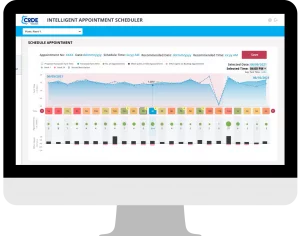




THE APPROACH
Gramener’s advisory team helped USCS breakdown the challenge and tackled it in the following way:
Create a roadmap of USCS’s high-impact initiatives
With Gramener, USCS utilized the ‘Data-to-Value’ RADAR methodology and toolkits. This is a 5-step approach to identify the strategic data science initiatives that could help USCS achieve its business objectives by moving forward as a data mature organization.Take initiatives through rapid experimentations
The chosen initiatives at USCS were taken through a series of rapid data science experimentations. These were based on Gramener’s ‘innovation funnel’ approach. Piloted at USCS’s warehouses, the qualified initiatives that garnered good business impact were moved to production.
Gramener worked with USCS technology team to create the right data science processes, onboard the skilled personnel, and deploy production-ready solutions. This has led to 3 data science applications.
Moving ML solutions to the production stage
Based on the results, 3 data science applications were rolled out across 40+ warehouses. The first solution to be rolled out was the intelligent appointment scheduler. This predictive AI solution helped USCS warehouse teams to identify ideal appointment slots every day to keep the warehouse optimally staffed and achieve the best turn times on warehouse pickups. With a 16% improvement in turn times, the experimentation was picked for large scale deployment.
Constant monitoring and measuring ROI
With support from USCS leadership, its technology teams integrated the solutions with business processes. This helped in the widespread adoption of the solutions. In fact, Q2 2021 saw over 80% adoption in a few of the largest USCS warehouses.
Gramener enabled the adoption of data science solutions by sharing industry best practices, educating the users, improving the ease of use and building ground-level support. The business value generated was tracked and quantified using an ROI framework.
Setting up for the next phase of transformation
Gramener has assisted USCS in setting up a governance committee with institutionalized processes in place. This could help achieve repeatable outcomes from the data science transformation being carried out at USCS.
The organization continues to scope out data science initiatives. The leadership team drives the initiatives by storytelling the vision and highlighting its importance across the organization.
In a phase-wise manner, USCS is extending this partnership with Gramener in three major areas – transportation, automation, and digitization.

THE IMPACT

3 data science applications in production across 26 warehouses

16% reduction in warehouse dwell time on outbound schedules

80% accuracy in the forecasting of potential demand spikes

13% more appointments at warehouses & $300K drop in detention charges
Read more case studies
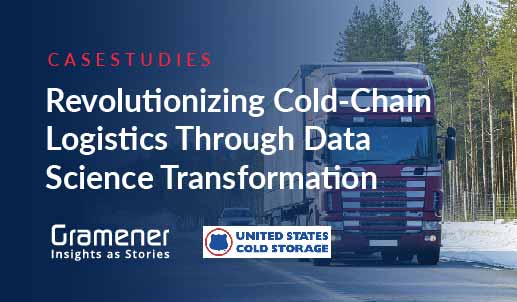
Revolutionizing Cold-Chain Logistics with Data Science
Gramener helped logistics leader United States Cold Storage revolutionize its logistics operations with a unique 'advisory-to-implementation’ approach.
Read More
Predicting Disasters with SEEDS India and Microsoft
Gramener, in partnership with Microsoft, developed a Machine Learning – driven disaster impact model to predict disasters and save lives.
Read More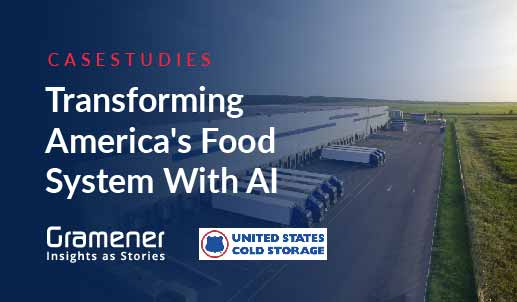
Transforming America's Food System using AI with USCS
We joined hands with USCS, a major in cold chain industry, to build an Intelligent Appointment Scheduler to automate the manual carrier scheduling.
Read More
Fighting Diseases with Geospatial AI
Read and download the case study of our partnership with Microsoft and World Mosquito Program (WMP) to build Geospatial AI driven solution to fight mosquito borne diseases.
Read More
Building Urban Resilience with Spatial Analytics
Our partnership with Microsoft and Evergreen Canada resulted in building urban resilience by analyzing climate change & other datasets & building a unique Data Visualization tool.
Read More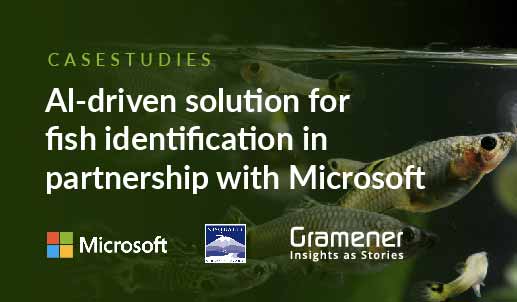
Salmon Detection Web App For Nisqually River Foundation
Read and download the case study of our partnership with Microsoft to develop AI solutions to automate fish species identification at the Nisqually River Foundation.
Read More
Primetime Viewership using Visual Data Journalism with Republic TV
Read and download the case study to know how Republic TV simplified election data reporting using data journalism and a cutting-edge visual analytics tool from Gramener.
Read More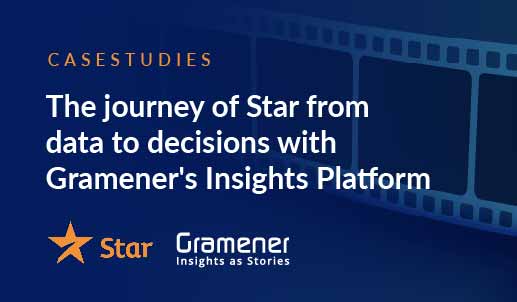
Automated Insights from Viewership Insights Platform
Read and download the case study to know how Star India is leveraging the Insights platform to understand their viewership across regions and create better content.
Read More
Data-Driven Design Thinking with Micro Focus
Read and download the case study to know how Micro Focus pitched its cybersecurity solution to a competitive market with data-driven design and storytelling features.
Read More
BI Reporting with Unified Data Marketplace For Conduent
Read and download the case study to know how Conduent is using a unified data marketplace to collaborate all BI reports at one place, enabling quick decision-making.
Read More
Visual Analytics Platform For Operational Excellence At DHFL
Read and download the case study to know how DHFL was able to sell their retail portfolio worth 15 thousand crores INR to nine banks using a visual analytics platform.
Read MoreGet a Copy of the case study




